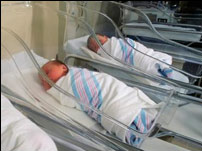New Treatment Offers Hope to Oxygen-Starved Newborns
Brain damage can be avoided, Hammersmith Hospital research shows
Babies who are starved of oxygen around the time of birth now have better than ever chances of avoiding brain damage.
According to a study carried out by doctors at Hammersmith Hospital, brain damage can be prevented in over 100 babies a year, using a new cooling treatment.
During the research, funded by the Medical Research Council, more than 100 babies who had been starved of oxygen or blood at birth (birth asphyxia), had their body temperature reduced to 33–34°C for 72 hours, followed by gradual re-warming in intensive care.
Dr Denis Azzopardi, co-chief investigator, neonatologist and reader in neonatal medicine at Hammersmith Hospital, said: “The study builds on a 20-year body of research but gives, for the first time, irrefutable proof that cooling can be effective in reducing brain damage after birth asphyxia.”
The cooling treatment is given in the first six hours of a newborn’s life to babies who have shown signs of lack of oxygen during birth.
Although the treatment is not effective in every case, results show that the proportion of babies that survived without signs of brain damage rose from 28 to 44 percent with cooling treatments – a 57 percent increase.
Imperial College Healthcare currently offers brain-cooling treatment to newborn babies in its neonatal unit at Queen Charlotte’s & Chelsea Hospital in Du Cane Road. The researchers are now looking at potential treatments that can be added to cooling to further reduce brain damage in affected babies.
Birth asphyxia, which affects around one in 1,400 infants a year in the UK, can cause serious brain damage, severe cerebral palsy and even death.
October 2, 2009
Related links
|
